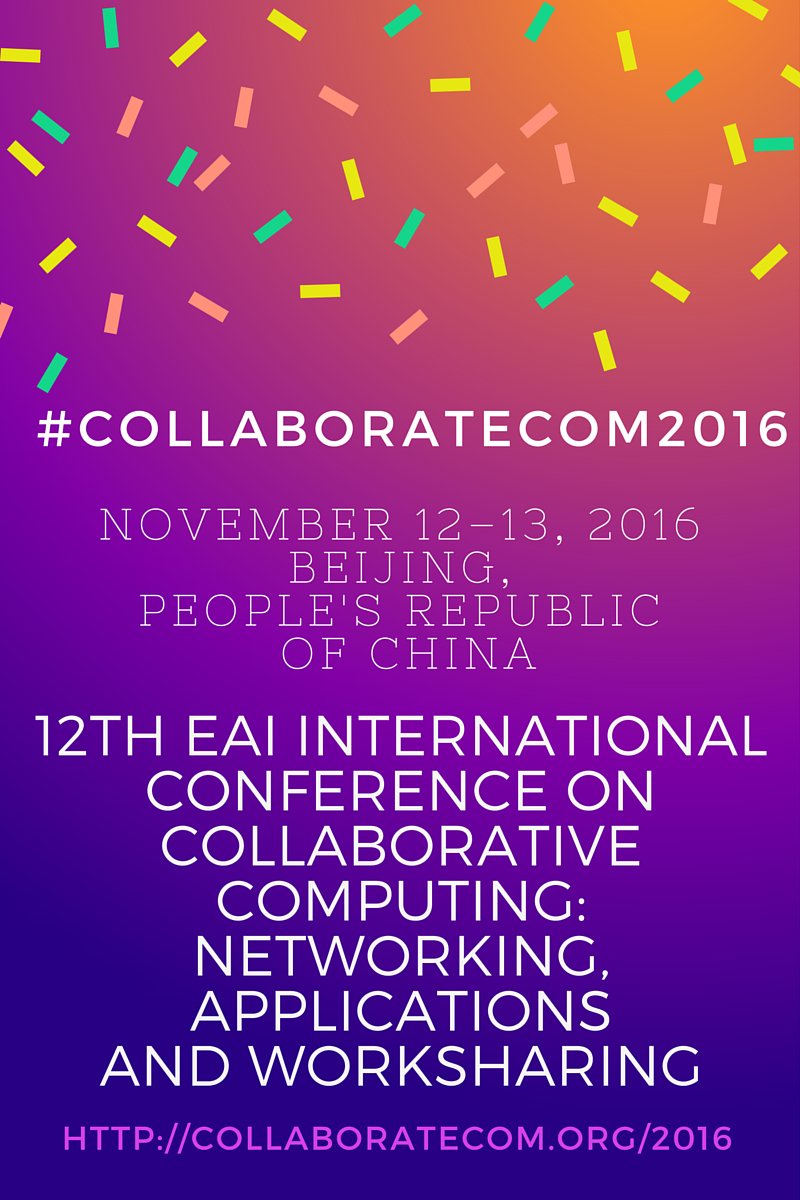Proceedings published:
https://eudl.eu/proceedings/collaboratecom/2016
IMPORTANT NOTE:
- The registration is open, please REGISTER HERE
-
Due to system update, we kindly ask all authors to check their Confy account and submissions. If you have more questions, contact us here.
Follow us on Twitter at #COLLABORATECOM2016

Proceedings for CollaborateCom2015 have been published
Over the last two decades, many organizations and individuals have relied on electronic collaboration between distributed teams of humans, computer applications, and/or autonomous robots to achieve higher productivity and produce joint products that would have been impossible to develop without the contributions of multiple collaborators. Technology has evolved from standalone tools, to open systems supporting collaboration in multi-organizational settings, and from general-purpose tools to specialized collaboration grids. Future collaboration solutions that fully realize the promises of electronic collaboration require advancements in networking, technology and systems, user interfaces and interaction paradigms, and interoperation with application-specific components and tools.
The 12th International Conference on Collaborative Computing (CollaborateCom 2016) will be held in Beijing, China, and continue to serve as a premier international forum for discussion among academic and industrial researchers, practitioners, and students interested in collaborative networking, technology and systems, and applications.
Highlights
- The event is organised by the European Alliance for Innovation, a leading community-based organisation devoted to the advancement of innovation in the field of ICT.
- All accepted papers will be published by Springer and made available through SpringerLink Digital Library, one of the world's largest scientific libraries.
- Proceedings will be submitted for indexing by DBLP, Google Scholar, ASTP, ISI, EI Compendex,Scopus and many others.
Topics
Topics of interest include, but are not limited to:
- Participatory sensing, crowdsourcing, and citizen science
- Architectures, protocols, and enabling technologies for collaborative computing networks and systems
- Autonomic computing and quality of services in collaborative networks, systems, and applications
- Collaboration in pervasive and cloud computing environments
- Collaboration in data-intensive scientific discovery
- Collaboration in social media
- Big data and spatio-temporal data in collaborative environments/systems
- Collaboration techniques in data-intensive computing and cloud computing
- Collaborative e-education, e-learning, and collaborative computing in large scale digital libraries
- Collaboration in health-care environments
- Collaborative information seeking
- Collaborative mobile networks and infrastructures
- Collaborative technologies for fast creation and deployment of new mobile services
- Collaborative sensor networks, unmanned air and ground vehicle networks and applications
- Collaborative, context-aware infrastructure
- Collaborative, location-aware mobile systems/applications
- Computer supported collaborative work with distributed systems
- Cyber-physical systems
- Distributed collaborative workflows
- Data management and middleware support for collaborative information systems
- Energy management for collaborative networks
- Group-driven composition of systems from components
- Human-centric ubiquitous collaboration
- Human-robot collaboration
- Internet of Things (IoT) and collaboration
- Methodologies and tools for design and analysis of collaborative user applications
- Models and mechanisms for real-time collaboration
- Multi-agent technology and software technologies for collaborative networking and applications
- Peer-to-peer and overlay networks, systems, and applications
- Security, privacy and trust management in collaborative networks, systems, and applications
- Simulation, performance evaluation, experiments, and case studies of collaborative networks and applications
- Software design, testing, and experimentation technology for collaborative networking and applications
- Theoretical foundations and algorithms for collaborative networks, applications, and worksharing
- Tools for collaborative decision making processes
- Trustworthy collaborative business processing in virtual organizations
- Visualization techniques, interaction devices and visual languages for collaborative networks and applications
- Web services technologies and service-oriented architectures for collaborative networking and applications
- Workflow management for collaborative networks/systems









































